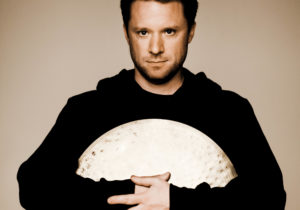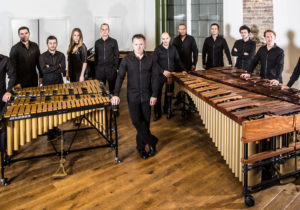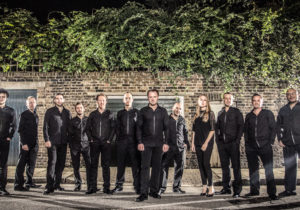Colin Currie
Interview
Percussionist Colin Currie, appearing in Time Unwrapped, discusses his approach to performance with Amanda Holloway.
Percussion virtuoso Colin Currie first heard the work of Steve Reich as a teenager and his obsession with Music for 18 Musicians led to a comprehensive investigation of Reich’s other works. In 2011 Currie formed his own ensemble to specialise in performing Reich. For Time Unwrapped the Colin Currie Group brings a programme of Music for Pieces of Wood, Mallet Quartet and the ground-breaking Drumming Part 1, plus the recent Quartet.
What’s your favourite instrument?
I find the keyboard percussion instruments the most alluring, especially when used in combination. Many pieces now use a number all arranged around one player – for example in the concerto written for me by Einojuhani Rautavaara, I have a tuned set-up of marimba, vibes, crotales and tubular bells which I pretty much play all at once. Pushed to pick one, it would have to be the marimba, which is now, in fully emancipated fiveoctave form, a stunning keyboard instrument by any yardstick, rich in tone and full of possibilities.
How do you practise?
Practice days start fairly punctually; I’m usually at work by 9am. I take a break some time around noon, often to take some exercise – running or biking. Then I work in the afternoon once again, usually I’m revising repertoire by that stage in the day. I never practise in the evening when I’m at home. On the road, I grab what I can when I can.
What’s the weirdest object you’ve ever played?
A cardboard carpet tube, amplified and used to underpin an entire movement of a concerto (Tan Dun’s Paper Concerto). I only managed to source it on the day of the concert, from a market stall in the De Pijp area of Amsterdam.
‘The marimba is a stunning keyboard instrument, rich in tone and full of possibilities.’
What clothing and footwear do you wear for your best performance?
In certain areas of my life, I am guardedly superstitious. I have been wearing the same concert trousers and shoes since I was 19. I believe if I lost them, I would be unable to perform.
How important is the concept of time to a percussion player?
The concept of time in music is fundamentally important and highly absorbing. It is largely instinctive and, after much thought, I would have to say that it can only be taught up to a point. In Steve Reich’s music, it is crucial, and generally requires absolutely, resolutely solid stability. Occasionally, however, we’ll allow the music to ‘sit on the front foot’, or, less often, sit back some. As percussionists we are very aware of such matters.
What are you playing in Time Unwrapped?
We’ll be presenting a mixed programme of the music of Steve Reich. This ensemble is devoted entirely to this music and we have worked regularly with him for many years now. Each set comprises three pieces, two chamber works surrounding a counterpoint work (in which soloists perform live against multiple layers of themselves in a backing track). The programme culminates in a recent work, written especially for the CCG, Quartet for two pianos and two vibraphones. This has been an amazing work to embrace and perform – it keeps gaining depth and beauty the more we perform it! Unlike a lot of his music, there is less immediately obvious repetition and significantly more changing of key signatures. The result is very definitely a Steve Reich classic… with a brilliant new edge.
Was Steve Reich the obvious choice for a programme about time?
This music has a particularly strong relationship with the concept of time, as it challenges and charms the listener with its ability to make it seem to stand still, slow down and indeed speed up. As with time, every individual will have their own subjective experience, leaving much to discuss after the concert.


